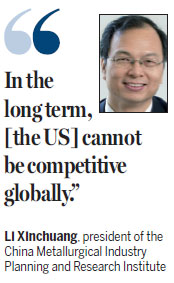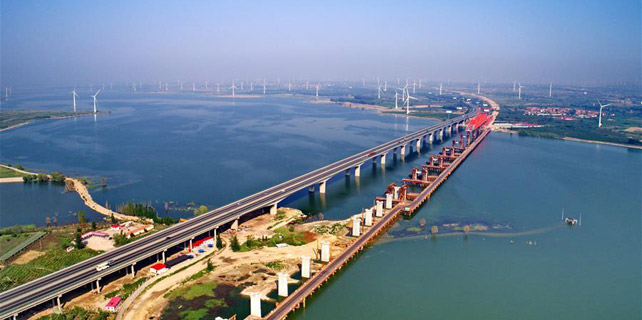Steel protectionism could backfire, hurt US, expert believes
Protectionism against Chinese steel is ultimately bad for American consumers, and the high cost of US steel could lead to lower US auto production, according to one of China's top steel experts. Expensive steel in the US leads to less competitiveness in the market overall and "causes more trouble for the customers" who have to pay the price for protectionism, said Li Xinchuang, president of the China Metallurgical Industry Planning and Research Institute (MPI).
"[The US] has some of the highest costs for steel, and in the long term, the country cannot be competitive globally," he told China Daily on the sidelines of the 32nd Steel Survival Strategies conference held by World Steel Dynamics and American Metal Market.
"Protectionism cannot solve your problems, and it is bad for US customers," he said.
The US imported 29.9 million tons of steel last year, 789,000 of which were from China. China's steel exports to the US represent only 2.6 percent of US total imports, which have dropped from a high of 7.2 percent in 2014, according to statistics from the US Commerce Department.
China was the 11th biggest source country of steel for the US in 2016, and in the first half of 2017, was the 12th largest, according to MPI data.

US steel companies have blamed overcapacity in the Chinese steel market for driving down global prices of steel, with US President Donald Trump saying in April that the US might impose stricter tariffs on foreign steel imports.
The US Commerce Department is expected to release a report this week on whether foreign steel imports threaten US security.
The International Monetary Fund's Christine Lagarde warned that protectionism poses a serious threat to global growth.
Li said that China's steel economy has been able to flourish over the last several decades because of enormous economic growth and a robust local need for manufacturing and infrastructure building: "Why is Chinese steel high quality? Because we [have had] a competitive domestic market," he said.
Li also acknowledged that China is looking to reduce overcapacity long term and eliminate about 50 million tons of capacity in 2017.
Despite friction between the two countries on steel, Li said that China is open to US steel companies that may want to participate in the Belt and Road Initiative, which already has in place millions of dollars worth of infrastructure projects along the old Silk and Maritime Roads.
"In our perspective, the Belt and Road Initiative is created by China but welcomes participation from all countries, particularly the US," Li said.
"[Project volume] will increase over time, and China alone cannot possibly cover everything, so we really need cooperation and inclusive and market-oriented strategies [from other countries]. It's the only way to make One Belt One Road successful," Li said.
amyhe@chinadailyusa.com
(China Daily USA 06/29/2017 page2)
















